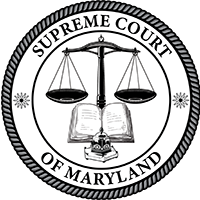SCHEDULE OF ORAL ARGUMENTS
September Term, 2025
Monday, January 5, 2026:
Bar Admissions
No. 33 Kapneck 14-16, LLC v. Bkeezy's Speakeasy, LLC
Issues – Real Property – 1) Does a commercial tenant have a right to advance notice as identified by Md. Code, Real Property (“RP”) § 8-401(c)(1) before filing an action under RP § 8-401? 2) Is a commercial tenant’s waiver of the right of redemption in a lease enforceable where the landlord seeks to reclaim possession under RP § 8-401?
Attorney for Petitioner: Alyssa W. Chang
Attorney for Respondent: Rebekah D. Lusk
No. 36 Davinder Singh v. State of Maryland
Issues – Criminal Law – 1) As a matter of first impression, does placing someone in the back seat of a police car constitute a display of force that converts an investigative detention into a de facto arrest requiring probable cause, when the display of force was not needed to protect officer safety or prevent flight? 2) Was Petitioner subjected to a de facto arrest requiring probable cause when police placed him in the back seat of a police car with the doors shut for more than an hour and there was no evidence he was a threat to officer safety or a flight risk, as evidence by the fact that officers never frisked Petitioner and, when asked, testified they placed Petitioner in the police car because they wanted to “move him from the scene” of the accident and because they were “instructed” to do so? 3) Was Petitioner apprehended for the purposes of Md. Code, Courts and Judicial Proceedings, § 10-303 when he was placed in the police car at 7:43 a.m., such that the breath test that was conducted at 10:15 a.m. violated the statute’s two-hour time limit, requiring the exclusion of the results?
Attorney for Petitioner: Allison Pierce Brasseaux
Attorney for Respondent: Madeleine Mietus
Tuesday, January 6, 2026:
No. 34 Xavier S. Kopp v. State of Maryland
Issues – Constitutional Law – 1) May reasonable suspicion for a Terry stop be predicated upon a citizen caller’s personal report to a police officer, in which the citizen caller claims suspicion of “illegal activity” based upon wholly innocent conduct, without some articulation by the police officer of how that conduct is indicative of criminality? 2) Did the lower courts misapply Washington v. State, 482 Md. 395 (2022), in determining whether the residential townhome neighborhood in this case was a “high crime area”? 3) Did the lower courts err in determining there was reasonable suspicion under the totality of circumstances in this case; and, therefore, did the motions court err in denying Petitioner’s motion to suppress evidence?
Attorneys for Petitioner: Toni Holness and Peter F. Rose
Attorney for Respondent: James N. Lewis
No. 35 Maryland Department of Health v. Jeffrey Boulden, et al.
Justice Hotten will sit in place of Chief Justice Fader.
Issues – Criminal Procedure – 1) Did ACM err in upholding monetary sanctions as “reasonably designed to compel compliance” with the Department’s obligation to admit criminal defendants within 10 business days of their being committed as incompetent and dangerous, where the Department’s failure to admit these defendants resulted from an extreme shortage of hospital beds that it is making extensive efforts to alleviate? 2) Did ACM err in upholding sanctions issued when the Department had already admitted the defendant, so that there was no compliance left for the trial court to compel?
Attorney for Petitioner: Julia Doyle
Attorney for Respondent: Michael T. Torres
Thursday, January 8, 2026:
No. 39 Lance Cutchember v. State of Maryland
Issue – Criminal Procedure – Does § 1-211(c) of the Criminal Procedure Article apply retroactively? (This issue is similar to those found in No. 40, September Term, 2025).
Attorney for Petitioner: George Harper
Attorney for Respondent: Virginia S. Hovermill
No. 40 Phillip Antoine Hicks v. State of Maryland
Issues – Criminal Procedure – 1) When the General Assembly determined that the smell of cannabis alone would not constitute a basis for a stop or search, did it clearly demonstrate its intent that the enabling statute, Md. Code Ann., Criminal Procedure (“Crim. Proc.”) § 1-211, apply prospectively and not retrospectively when it used the phrase, “Evidence discovered or obtained in violation of this section…is not admissible in a trial, a hearing, or any other proceeding in § 1-211(c)? 2) If the General Assembly’s intent regarding prospective or retrospective application of Crim. Proc. § 1-211 is ambiguous, should the statute be applied in cases where the stop or search occurred before the effective date of the statute, but the suppression hearing occurred after the effective date, because the statute is procedural and not substantive, because the statute is remedial, and/or because Waker v. State, 431 Md. 1 (2013) requires retrospective application?
Attorney for Petitioner: Wyatt Feeler
Attorney for Respondent: Virginia S. Hovermill
After January 8, 2026, the Court will recess until February 5, 2026.
On the day of argument, counsel must register in the Clerk’s Office no later than 8:30 a.m. unless otherwise notified.
GREGORY HILTON
CLERK

